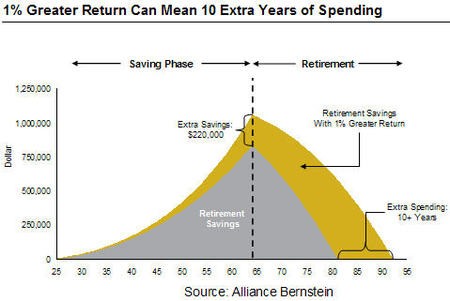Understanding Mutual Fund Fees
Post on: 29 Март, 2015 No Comment

November 22, 2012
The first thing to understand about mutual fund fees is that, whether you see the mutual fund fees or not, you pay them.
There are various classes of shares of each mutual fund available for purchase (a mutual fund may offer various classes of shares to investors the differences are in the mutual fund fees and expenses of each share class). Several common share classes are: Class A, Class B and Class C. Each share class requires a management and operating fee and many share classes charge a 12b-1 fee.
Mutual Fund Management Fees & Operating Fees
All share classes of mutual funds carry fees that are paid out of the fund’s assets to the fund’s investment advisors (as opposed to paying the advisor who sells the fund). In other words, investors see these fees as a reduction in their net returns versus an expense on their bank or brokerage statement.
Fees and expenses vary greatly from fund to fund and may range from less than .10% to more than 2.00%, depending on the investment style, market capitalization, fund assets, fund company and share class of the fund.
12b-1 Fees
SEC Rule 12b-1 authorizes a mutual fund to pay distribution and shareholder services fees to brokers to compensate them for marketing and selling their fund shares. The Financial Industry Regulatory Authority (FINRA) limits the size of these 12b-1 fees to 1.00%. These fees are deducted directly from the fund’s assets (i.e. the investor does not see the fee on his/her bank or brokerage statements).
Mutual Fund Fees and Class A Shares
Class A shares generally have front-end sales charges (also known as a “load”). The load is paid to the advisor for buying the mutual fund on behalf of investors. The Securities and Exchange Commission (SEC) does not place restrictions on the size of the sales loads charged by a fund, but FINRA imposes a limitation of 8.5% (although, according to the SEC, most funds charge far less than this).
It’s important to realize that you are entitled to breakpoint discounts on front-end sales charges if you purchase a certain amount (or commit to investing a certain amount) of the mutual fund, or if you purchase a certain amount of various funds within the same fund family. Class A shares, like all funds, carry investment management fees that are paid to the fund company to manage the fund’s investments. Many Class A shares also carry a 12b-1 fee (a 12b-1 fee of .25% is common) that is used paid to the advisor for his/her ongoing service.
Class B Shares Also Have Mutual Fund Fees
Class B shares do not carry front-end sales charges, but carry a contingent deferred sales charge (CDSC) and a higher 12b-1 fee (a 12b-1 fee of 1% is common). The CDSC is a surrender charge imposed on shareholders should they sell their shares in the fund prior to the surrender period. The CDSC is not paid to the advisor, but is paid to the fund company to cover its various costs. These costs include an upfront commission to the advisor (often as high as 4%). Once again, investors do not see these upfront commissions paid to the advisor.
The amount of the CDSC is outlined in the fund’s prospectus and depends on how long the investor holds his/her shares. Many Class B share funds have a CDSC that is reduced to 0% in year six and in year seven converts to a Class A share (which carries no surrender charges and has lower 12b-1 fees).
For example, if you purchase $10,000 of a mutual fund Class B share, the full $10,000 is invested in the fund immediately (as opposed to a Class A share, where a sales charge is deducted from your total investment). However, if you sell these shares in the fund during the first year, you could be charged a CDSC of 5% to redeem your shares.
Class C Shares and Mutual Fund Fees
Generally, Class C shares do not have an upfront load, but charge a CDSC of 1% for one year. Class C shares generally carry a 12b-1 fee of 1% and do not convert to Class A shares (the 12b-1 fee is not reduced).
Do No-Load Shares Have Mutual Fund Fees?
No-load mutual fund shares are traditional staples of do-it-yourself investors or advisors that charge an asset-based investment fee. No-loads do not carry a sales charge and generally have lower management fees (and no 12b-1 fees).
mutualfunds.about.com/od/mutualfundfees/a/fundfees.htm














